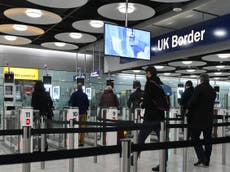After Brexit, budget holidays will be a thing of the past. Here's why
Any replacement for free movement, even if visa-free, will require a registration fee that’ll add to the expenses of family holidays. It is a fact that no politician has been upfront about and no journalist has pressed interviewees on
As the nation emerges from the debris of the World Cup and the Trump baby balloon, I have something rather more specific on my mind – the impact of the Brexit White Paper on my future holidays.
I don’t know about you, but I am already fantasising about sipping Sangria and basking in some Spanish sunshine in a fortnight’s time, as the British sun dims back to normality. So I read those pristine, 104 pages of the White Paper to check what would happen once we eventually meet “Brexit proper” in 2021, after the transitional period ends on 31 December 2020.
Put simply, what my research into the paper found was that our holidays to the French caravan parks, the Spanish resorts and villas, the Croatian music festivals or the regretful lads’ getaways won’t be quite so simple in the summer of ‘21.
Why? Because of the end of free movement and its vague replacement, “the mobility framework”.
Firstly, we must note that immigration rules between the UK and EU are set to be reciprocal. Therefore, by looking at how EU citizens arriving here will be treated, as set out in the Brexit White Paper, this allows us to know how we’ll be treated as UK citizens visiting the EU.
To give an insight into what tourism into the UK is like without free movement, what’s the current situation for non-EU tourists?
Well, you need a Standard Visitor Visa, which will set you back £93. Don’t feel like adding £93 per person to your holiday over to France or Spain? Not to fear; the White Paper promises us all “reciprocal visa-free travel arrangements to enable UK and EU citizens to continue to travel freely for tourism in the future”.
Problem solved?
Not quite – “visa free” isn’t as simple as it sounds, as if you have unchecked tourists being able to arrive by simply saying they’re a tourist, what’s to stop them staying far beyond a period of tourism? There needs to be some kind of register at least, if there is no visa system or EU free movement.
The UK provides precious little detail of what this reciprocal system to deal with EU-UK (and vice versa) tourism will be, but they do try to allay fears by using an example: the “UK already has existing arrangements with low-risk, non-EU countries that enable smooth access at the border, such as the Registered Traveller Scheme in place with a number of countries like the US and Japan”.
So what is this Registered Traveller Scheme if it’s going to be the standard-bearer for UK and EU citizens’ “smooth” visits to each other’s country?
Basically, if you are a Registered Traveller Member, you can use the faster lanes in the airport and don’t have to fill out a landing card.
However, you only become a member after a long process – firstly, you pay £70 [https://www.gov.uk/registered-traveller/how-to-apply]. You then wait 10 working days to find out if you’re eligible to be a member. If you are, hop on your flight, and when you land you still have to go in the slow passports lane, you still have to fill out a landing card and then you have to be questioned by an immigration officer who’ll decide if you’ve met the criteria and are allowed to become a hallowed “member” and enter the country for your holiday.
So where is the streamlined bit? Ah, well, that’s the funny part – it’s the next time you travel using the membership, which only lasts 12 months; and that 12 months starts running from when you apply. So, under this system, if you apply in March 2021, ahead of a holiday in July ‘21, the Membership will run out in March 2022, meaning you’ll need to go through the whole palaver and expense again for your 2022 summer holiday to the EU, like you’d never been a registered member before.
Now, to be fair, the White Paper claims “tourists and business visitors should not routinely have to face questions about the purpose of their visit. The UK also wants to minimise administrative burdens for those seeking permission to travel…including short, simple and user-friendly application processes”.
Yet the honking problem with this is that the example it uses as “smooth” travel is none of these things. It also highlights the unavoidable truth that any replacement for free movement, even if visa-free, will require a registration fee that’ll add to the expenses of family holidays. It is a fact that no politician has been upfront about and no journalist has pressed interviewees on.
So, all in all, as currently set out in the Brexit White Paper, simple summer holidays to our favourite European destinations are set to get far more complicated and expensive to just get beyond the airport.
It’s worth remembering that for the entire history of budget airlines, we’ve enjoyed free movement of persons; when it ends, families will face added expenditure that we’ve never had to contemplate in our flights to Europe before.
With Brexit, we might not be “leaving Europe”, but it looks set to become far less accessible.



Join our commenting forum
Join thought-provoking conversations, follow other Independent readers and see their replies